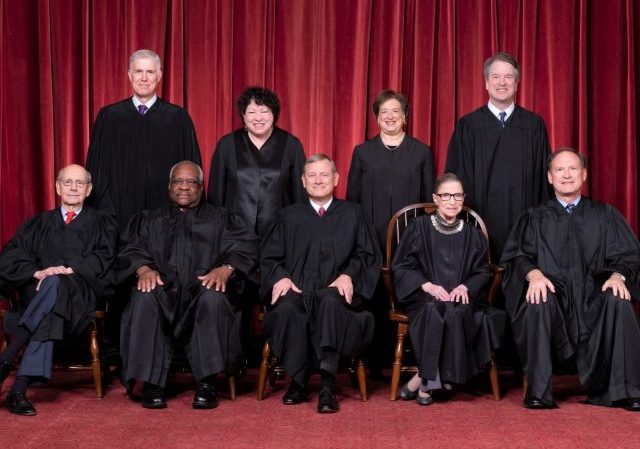Supreme Court stays Louisiana anti-abortion law, Roberts sides with liberals

The Supreme Court has granted a stay of the new Louisiana anti-abortion law, in a 5-4 vote with Chief Justice Roberts siding with the four liberal Justices. The law in question requires a doctor performing abortion to have admitting privileges at a nearby hospital, which critics alleged would result in only a single abortion doctor in the entire state.
This is only a stay pending appeal, not an ultimate disposition of the case.
The Order provides:
The application for a stay presented to JUSTICE ALITO and by him referred to the Court is granted, and the mandate of the United States Court of Appeals for the Fifth Circuit in case No. 17-30397 is stayed pending the timely filing and disposition of a petition for a writ of certiorari. Should the petition for a writ of certiorari be denied, this stay shall terminate automatically. In the event the petition for a writ of certiorari is granted, the stay shall terminate upon the sending down of the judgment of this Court.JUSTICE THOMAS, JUSTICE ALITO, JUSTICE GORSUCH, and JUSTICE KAVANAUGH would deny the application.
Kavanaugh wrote a dissent which provided in part:
I respectfully dissent from the Court’s stay order. In this case, the plaintiffs raised a pre-enforcement facial challenge to Louisiana’s new admitting-privileges requirement for doctors who perform abortions. The Fifth Circuit rejected the plaintiffs’ facial challenge based on that court’s factual prediction that the new law would not affect the availability of abortions from, as relevant here, the four doctors who currently perform abortions at Louisiana’s three abortion clinics. In particular, the FifthCircuit determined that the four doctors likely could obtain admitting privileges. The plaintiffs seek a stay of the Fifth Circuit’s mandate. They argue that the Fifth Circuit’s factual prediction is inaccurate because, according to the plaintiffs, three of those four doctors will not be able to obtain admitting privileges. As I explain below, even without a stay, the status quo will be effectively preserved for all parties during the State’s 45-day regulatory transition period. I would deny the stay without prejudice to the plaintiffs’ ability to bring a later as-applied complaint and motion for preliminary injunction at the conclusion of the 45-day regulatory transition period if the Fifth Circuit’s factual prediction about the doctors’ ability to obtain admitting privileges proves to be inaccurate.* * *In order to resolve the factual uncertainties presented in the stay application about the three doctors’ ability to obtain admitting privileges, I would deny the stay without prejudice to the plaintiffs’ ability to bring a later as applied complaint and motion for preliminary injunction at the conclusion of the 45-day regulatory transition period. The Court adopts an approach—granting the stay and presumably then granting certiorari for plenary review next Term of the plaintiffs’ pre-enforcement facial challenge—that will take far longer and be no more beneficial than the approach suggested here. I respectfully dissent from the Court’s stay order.
It’s unlikely the law ever is going to be allowed to go into effect in the current configuration of the court.
This Scotusblog tweet seems right:
Tonight’s injunction suggests that the Court is not poised to pivot hard in the direction of limiting abortion rights. Both the Chief Justice (in granting the injunction) and Kavanaugh (in saying he would deny it pending factfinding) seem inclined to hew to existing precedent.
It’s also clear that Chief Justice Roberts is the new swing vote.
CLICK HERE FOR FULL VERSION OF THIS STORY